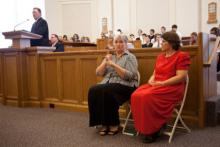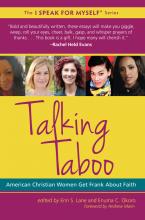Sexuality
![Houston Mayor Annise Parker. Photo courtesy of Zblume (Own work) [Public domain], via Wikimedia Commons/RNS.](https://sojo.net/files/styles/medium/public/blog/Annise_Parker-336x369.jpg)
Houston Mayor Annise Parker, who drew headlines for becoming the first openly lesbian mayor of a major American city, led support for the ordinance. The measure bans anti-gay discrimination among businesses that serve the public, private employers, in housing and in city employment and city contracting.
Under one of the hotly contested parts of the ordinance, transgender people barred access to a restroom would be able to file a discrimination complaint.
The ordinance, which exempted religious institutions, was passed in June, though its implementation has been delayed due to legal complaints.

United Methodists in Pennsylvania have agreed to resolve a complaint filed against three dozen clergy who blessed a gay wedding without taking the case to trial.
A complaint was filed against 36 United Methodist pastors who officiated at a Nov. 9, 2013 wedding for two men at Arch Street United Methodist Church in Philadelphia. On Oct. 3, Philadelphia Area Bishop Peggy Johnson announced that the complaint had been resolved.
The resolution calls for the officiating clergy to acknowledge that they violated rules of the United Methodist Book of Discipline, which includes the denomination’s constitution. In return, the complaint will be withdrawn.
“Though I may sympathize with the pastoral concerns of the respondents, it is unacceptable to disregard and disobey the Book of Discipline,” Johnson said. “I pledge that, in future cases where clergy within my jurisdiction officiate or host a same-gender ceremony, any complaints that I receive will be handled swiftly and with significant and appropriate consequences, which may include a trial, involuntary leave of absence without pay, or other significant consequences, in accordance with the Discipline and in consultation with the Board of Ordained ministry and the clergy session of the annual conference.”

The issues sound like they belong on the therapist’s couch:
The couple that hasn’t had sex eight months into their marriage.
The parents who can’t deal with their son’s homosexuality.
The male teen who wants to be called by a girl’s name.
But they’re also the kinds of topics that frequently crowd the inbox of Russell Moore, who recently marked his first anniversary as the Southern Baptist Convention’s top public policy expert.
Though he often grapples with contentious political issues — the Hobby Lobby case, religious persecution, and, most recently, the immigrant border crisis — Moore has spent much of his first year at the Ethics & Religious Liberty Commission writing blog posts on Christian sexual ethics.
“Probably day to day I’m dealing with more church issues of how do we deal with these tough ethical issues,” he said recently.

Will the United Methodist Church soon have to drop the “United” part of its name?
A group of 80 pastors is suggesting that the nation’s second-largest Protestant denomination is facing an imminent split because of an inability to resolve long-standing theological disputes about sexuality and church doctrine.
But more than lamenting the current divisions, the pastors indicated there is little reason to think reconciliation — or even peaceful coexistence — could be found. Like a couple heading to divorce court, the pastors cited “irreconcilable differences” that can’t be mended.
“We can no longer talk about schism as something that might happen in the future. Schism has already taken place in our connection,” said the Rev. Maxie Dunnam, a retired president of evangelical Asbury Theological Seminary in Kentucky, who joined the statement.

“When we were children, we used to think that when we were grown-up we would no longer be vulnerable. But to grow up is to accept vulnerability … To be alive is to be vulnerable.”
These are the words of Madeleine L’Engle, and this week I’ve been reminded of the wisdom they contain.
This weekend, Christianity Today posted an excerpt from my new book, Jesus is Better Than You Imagined, in which I share a story about childhood sexual abuse and my adult struggle to understand my sexuality. Many have asked why I would do such a thing.
This wasn’t a career move or a brazen attempt to sell more books. Being open about these experiences as an evangelical writer leaves me, like so many scarecrows, exposed. I do not plan to become a spokesman for any of the issues addressed in this article. The events shared are a part of my story, but they are not the whole of my calling. Today, I return to my job as a columnist committed to exploring the interface between faith and culture and helping foster difficult conversations that others may be unwilling to have.

Thought experiment: You are single. You’re eager for a sociable night out on the town. You step into a bar full of attractive people. You:
— See a hot someone across the room and think, I want to be all over him/her.
— See a hot someone across the room and think, I want him/her to think I am so appealing that they just want to be all over me.
Which one is lust?
The lust I heard about in church only ever dwelt on the first train of thought. This lust was an overwhelming desire for someone else, to the point of obsession, objectification, or infidelity. It was dirty, aggressive, mulled over in accountability groups and discussed in sermons of marriage and singleness. ... I didn’t relate to it at all.
In conversation with other close Christian women, I learned they didn’t really relate to it, either. We didn’t treat men or other women as objects of desire. We had hormones, sure, but they were … different. Sometimes we saw men as actively desirable, but not necessarily. We usually just wanted men to want us.
Sometimes we wanted them to want us really, really badly.
Sometimes we needed them to want us. Sometimes that was the only thing we could think about. Sometimes we’d fall into a prolonged pout if men who OBVIOUSLY SHOULD WANT US because we were HOT AND AWESOME, in fact, didn’t.
... Oh. Hmmm.
*Lightbulb*
Is it possible that lust works in multiple ways? Is it possible that the all-consuming desire to be desired is just as lustful as the all-consuming desire to have?

I lust. The words almost seem like they could be a tagline for a new Apple product — an appropriate image perhaps for a generation that is glued to our smart phones. Or perhaps the words are better suited in a kind of Descartes revolution for the 21st century, “I lust, therefore I am.” In either scenario, the words are an accurate reflection of the inescapable truth that lust is consuming all of our lives.
In the church, the word lust has strong sexual connotations. It is a word we are ashamed of and work hard to ignore. When we do talk about lust, it is mostly in the context of uncomfortable sermons or youth group sessions about dressing modestly, not looking at porn, and not gazing at one another with desire. We also often think of lust as a sin that plagues only men — particularly young men with “raging hormones” and that it is something they need to “break free” from.
Essentially the message has become, “If you do lust, don’t; if you don’t lust, good.” But such assumptions do not accurately represent the complex and diverse ways that lust manifests itself in our lives. That being said, I sometimes think that if the seven deadly sins included a clause for a sin that was more deadly, feared, and misunderstood than all of the rest, this would be it.

When Mormon leaders sense a decline of moral standards in the world, they roll out sermons on modesty.
In the 1960s and early ’70s, they preached against miniskirts and hot pants; in today’s sex-drenched society, it’s spaghetti straps, bare midriffs, and skinny jeans.
It’s often couched in the rhetoric of “virtue” and usually aimed at young women, even girls.

THE WOMEN IN Talking Taboo: American Christian Women Get Frank About Faith aren’t just frank. They are courageous, clever, and wildly passionate.
This anthology, edited by Erin S. Lane and Enuma C. Okoro, asks 40 women under 40 to respond to the question, “What taboos remain in the church at the intersection of faith and gender?” The result is a collection of stories by women of faith (Baptist, Presbyterian, Mennonite, Catholic, Unitarian Universalist, and more) in a variety of roles (pastor, mother, writer, teacher, student, and more).
The women share times they have felt shamed, alienated, discouraged, or alone as women seeking a home in the church. From addressing domestic violence to lust to pregnancy to the role of a woman pastor’s body, the stories are raw in the way first-person narrative calls upon honesty and vulnerability to trump perfect prose or style.
Anthologies often stick to one structural extreme: Either they are rigid and theme-driven, or loose and nomadic. Talking Taboo follows the latter. Lane’s introduction promises no arc of narrative, no solid take-away message. The stories are here, she writes, because women are agreeing to “speak for ourselves.”

In this age of third-wave feminism, many Americans may not realize that Christian women continue to struggle with what many would deem outdated gendered notions. This includes things such as a woman’s calling being second to her husband’s, women as unwitting temptresses who therefore must hide their bodies, and that women may not lead (or sometimes even speak) in church. Both external and internal pressures and fears have historically kept women silent on these matters.
In the recently released Talking Taboo: American Christian Women Get Frank About Faith, 40 women under 40 address head-on many of the taboos remaining at the intersection of faith and gender, and how they are stepping out of historical oppression to make real change within the church.
In her book Lean In, author Sheryl Sandberg notes that while women are outpacing men in colleges and graduate schools, one cannot see this translate to positions of power within corporations. For this imbalance to be righted, Sandberg asserts that women must take charge of their circumstances: “The shift to a more equal world will happen person by person. We move closer to the larger goal of true equality with each woman who leans in.”
This is no less true of women in the church, and leaning in is exactly what the essayists of Talking Taboo are doing.
While Sandberg focuses on issues such as long work hours, daycare, and more flexibility for working moms, the common, though not exclusive, themes of Talking Taboo are sexuality and biblical interpretation.

Ask Kelley Taylor, a Southern Baptist college student, if she's opened the steamy pages of Fifty Shades of Grey, and she has a ready response.
"Some of my friends have read it but I decided not to because I just heard about the content and didn't think it was something I should be reading," said the North Carolina State University senior, who is majoring in wildlife biology. "I think that it's kind of contrary to what the Bible says about fleeing from sexual lust and temptation."
Taylor is not alone. Many evangelical women say they wouldn't touch the best-selling book, often described as "mommy porn" because of its escapist appeal to working mothers and suburban housewives. But evangelical leaders also realize that some members of their churches and Bible studies can't resist.

“Your body is a wrapped lollipop. When you have sex with a man, he unwraps your lollipop and sucks on it. It may feel great at the time, but, unfortunately, when he’s done with you, all you have left for your next partner is a poorly wrapped, saliva-fouled sucker.”
I cringed behind the wheel, appalled at the quoted words I heard coming from my audio copy of Half the Sky as authors Sheryl WuDunn and Nicholas Kristof discussed this statement uttered by Darren Washington, an abstinence educator, at the Eighth Annual Abstinence Clearinghouse Conference.
Sadly, it wasn’t too far off many Christian messages I’ve received about sex.
But let’s go back to the beginning.

BOSTON -- The one thing that Afrah Farah will tell you about her genital cutting experience is that it happened. She doesn’t want to say how old she was, where it happened, or who was or wasn't with her.
Yet, despite the painful memories that the experience evokes and her concerns about people's reactions, Farah, said she knows she has to speak out.
“It’s basically a traumatizing experience. It’s traumatizing for every young girl that goes through that. It’s something that sticks in your memory, and physically,” said Farah, a Somali immigrant who came to the Boston area by way of Kuwait and Germany in 2007, and now works as a drug developer in a Massachusetts laboratory.
“There are millions of people who are affiliated with this procedure -- parents, grandparents, people in the community -- and to label them all as bad people or barbaric, that’s wrong. You will push them away. To solve a problem like this, you need to approach people with respect.”
Because of its severity and prevalence, female genital mutilation (FGM, or "cutting") is arguably one of the most important human rights issues in the world. It’s also become increasingly important in the U.S. as the number of immigrants from countries where it is practiced grows.

It’s amazing what a difference six words can make in our understanding of a figure as central as Jesus to the lives and faith of so many. Even historians and others who don’t claim Christianity personally are intrigued by the scrap of text recently discovered to contain, in Coptic, the sentence fragment: “Jesus said to them, ‘My wife…’”
Was this Jesus of Nazareth? is it authentic? Did the author have an original source to pull from, or simply word-of-mouth legend? After all, this writing seems to be several hundred years newer than the synoptic gospels. Perhaps Jesus was speaking in parable, as he often did, or maybe the “wife” was the Church, which often is referred to as “the bride of Christ.” Who knows? It’s likely we never will, but the buzz that this find creates is more interesting to me than the source of the scripture itself.
Why do we care so much if Jesus had a wife and kids or not? Why does it seem to matter if he died without ever having sex?

Whether wrestling with one the of non-heterosexual identities or the exigencies of birth control, the hidden costs of pornography, or the viability of chastity, 21st-century Christians have been confronted with unforeseen challenges that have led us to rethink traditional teachings on sexuality.
In many cases, particularly in more progressive expressions of faith, our sexual ethics have adapted and shifted more quickly than our theology (as is often the case). For generations to come, however, a sound theological framework is needed to support a robust Christian sexuality capable of dealing with “the world we find ourselves in.” The hands and feet of our ethical impulses have progressed boldly into unexplored terrain, but unless we discover the body that will provide a balance and stability, such ethical stances will be bound to collapse.
What we need is “a new kind of sexuality,” a response to emerging realities that is both orthodox and open, free and faithful. Such a framework will ultimately be bound to the Great Tradition of the Church while resisting enslavement to interpretations and applications of this Tradition that are now seem incapable of addressing heretofore unexplored questions. It is such “a new kind of sexuality” that I offer here, a starting point as we begin to shape a foundation that will provide the solid ground from which our ethics might find roots. I believe that such a framework will consist of the following five characteristics.

I liked this film so much I've already seen it twice. Moonrise Kingdom is so good, in fact, I almost couldn't bring myself to write about it for fear of not doing it justice.
And yet, since I first took my 11-year-old nephew, Ethan, to see it last month, I've been talking about Moonrise Kingdom nonstop, encouraging everyone I know to go see it. It has captured my imagination completely, an absolute tour de force — wholly original and an "instant classic," as I heard one film critic utter tell a companion on his way out of the theater.
Perhaps Ethan, a mythology buff who's never met a fantasy film he didn't like, put it most eloquently when he said (surprising no one more than himself), "That was the best film I've ever seen."
Moonrise Kingdom is director Wes Anderson's seventh feature-length film to date. In an iconoclastic cinematic oeuvre unrivaled among filmmakers of his generation, Anderson's latest stands above the rest of his stellar films — Bottle Rocket, Rushmore, The Royal Tennenbaums, The Life Aquatic with Steve Zissou, Fantastic Mr. Fox and Darjeeling Limited — as an eloquent, funny, enduringly poignant homage to childhood and, moreover, to innocence.
In a word, the film is perfect. I wouldn't change a thing.

On the one hand, I’m encouraged when Christians can have more honest, open dialogue about sex and sexuality in the public forum.
On the other, I’m more than a little distressed when the matter at hand is about “Biblically-based” sexual submission.
For those unfamiliar, there are (at least) two camps in the Christian conversation about gender roles, one of which we can call “egalitarian,” and the other calls itself “complementarian.” The implication of the latter is that, though we are not the same, we males and females fit together in many ways like pieces of a puzzle, one complementing something the other lacks, and vice-versa.
And if the definition of complementarianism stopped there, I would be on board; but in truth it’s a thinly veiled case for women submitting to men. Sorry, but this isn’t complementary; it’s authoritarian.
In a recent post, Rachel Held Evans explained the troublesome issues with complementarianism well:
…For modern-day Christian patriarchalists (sometimes called complementarians), hierarchal gender relationships are God-ordained, so the essence of masculinity is authority, and essence of femininity is submission. Men always lead and women always follow. There is no sphere unaffected by this hierarchy—not even, it seems, sex.

Pundits and politicians who opine about the so-called war on women ought to take note of the lawsuits filed Monday against the Department of Health and Human Services contraception mandate by 43 religious groups, including several Catholic dioceses and colleges.
The suits object to the requirement that religious institutions provide their employees with insurance coverage for contraception, sterilization and abortion-inducing drugs.
In the propaganda surrounding the mandate, HHS seems to suggest that women’s only stake in the matter is “free” contraception. This is a shallow – and frankly demeaning – view of women, who, equally with men, have an important stake in the preservation of religious freedom in the United States.

This morning I prayed naked. This exercise is part of a 50 Day Challenge I am doing. Some friends of mine created 50 Suggestions to Embrace Healthy Sexuality and one of them is strip off one’s clothes and prostrate oneself. For me it looked more like huddling under my covers to stay warm (my bedroom is in a basement and my sensitive body doesn’t much care for its constant 65 degrees).
As I sat there praying, naturally I thought about my body. At first I began to consider all of its shapes and sizes—the feel of my skin and hair and curves underneath my palms. I thought about its beauty and how uniquely it was created. There are few other things that have skin similar to us humans. And we each have our own and only attributes: fingerprints that will never have a match; the unique combination of height, hair color, facial composition, and idiosyncrasies.
I am the only me. You are the only you. Ever. Period.

As I began reflecting on my past sexual interactions with men, I tried to bring God into the conversation for the first time.
It was easier to punish myself with guilt, follow youth group-style sexual boundaries or just say, "forget it" and do whatever I desired. I was reluctant to process my sexuality. Not only would it be a lot of work and uncover a lot of past hurt, but what if it unraveled foundational faith and lifestyle beliefs?
Up until six months ago, I had never questioned my decision to not have sex until I was married. I just did what I thought I was supposed to.
Once I began to reflect on it, though, I realized I was angry that God was asking me to wait. Or maybe it was OK to have sex, and God hadn’t told me sooner! I envisioned what would happen if I didn’t wait.